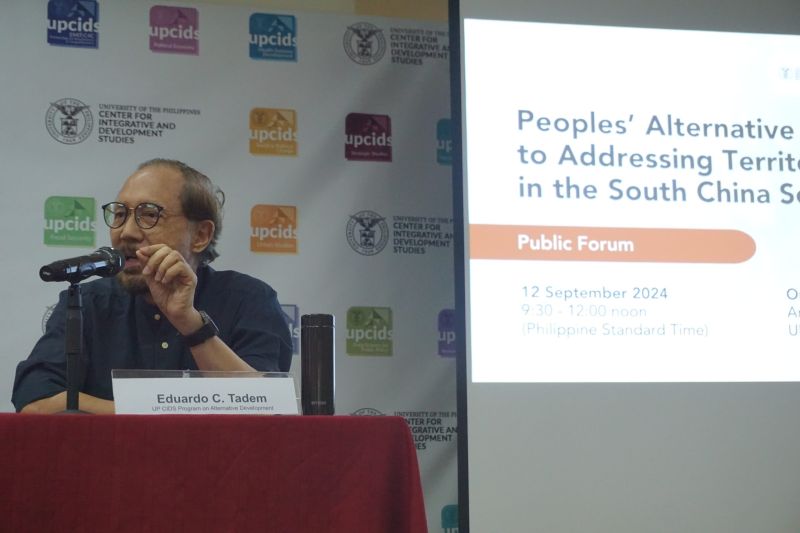AltDev with CSOs Explore Alternative Approaches in Territorial Disputes

Photo: Dr. Eduardo C. Tadem, Convenor of AltDev, UP CIDS, during the forum, “Peoples’ Alternative Approaches to Addressing Territorial Disputes in the South China Sea and Beyond.”
The Program on Alternative Development (AltDev) and various civil society organizations (CSOs) jointly organized a public forum, “Peoples’ Alternative Approaches to Addressing Territorial Disputes in the South China Sea and Beyond,” on 12 September 2024.
The forum featured Dr. Eduardo Tadem, AltDev Convenor; Pablo Rosales of PANGISDA Pilipinas; Merci Angeles of the Stop the War Coalition Philippines; and Pang Delgra of Partido Sosyalista. It aimed to explore alternative approaches to territorial disputes based on the principles of the commons, shared regional identity, joint development and resource sharing, people-to-people solidarity, and addressing the needs of affected communities, instead of merely focusing on issues of nationalism, national identity, sovereignty, territorial integrity, and inviolable state boundaries.
The discussion drew on territorial disputes in both Northeast and Southeast Asia, including: (1) the Diaoyu (Senkaku) Islands contested by China, Taiwan, and Japan; (2) the Dokdo (Takeshima) Islands between Korea and Japan; (3) South China Sea disputes involving the Philippines, China, Taiwan, Vietnam, Brunei, Malaysia, and Indonesia; (4) the Kuril Islands dispute between Japan and Russia; and (5) the Pratas (Dongsha) Islands conflict between China and Taiwan in the northeastern South China Sea.
From these cases, five key approaches were proposed for resolving such disputes:
- Establishing an agreement of cooperation. Drawing on the work of Nobel laureate Elinor Ostrom, the common pool resource (CPR) concept emphasizes collective action in managing shared resources. It advocates for the establishment of cooperative agreements to sustainably govern and equally share the yields of natural resources.
- Preserving for future generations and developing countries. This principle, rooted in the United Nations Convention on the Law of the Sea (UNCLOS III), asserts that certain areas and resources should be preserved for the benefit of all humanity, especially future generations and developing countries. This stands in contrast to the “freedom of the seas” doctrine favored by more developed nations like the United States, which promotes unrestricted exploitation of these areas.
- Joint development and management. This approach proposes that the contested regions should be jointly developed, managed, and their resources distributed equitably. By fostering regional cooperation, this strategy aims to shift the focus away from territorial nationalism, which often escalates conflict.
- Transforming disputed areas. A proposal was made to turn contested islands and waters into “spheres of border interaction,” where people can freely move and engage, as well as “subsistence spheres” for neighboring communities to share resources, and “demilitarized zones” to reduce tensions.
- Sharing regional commons. Scholar-activist Rasti Delizo suggested transforming the South China Sea into a shared regional commons, where maritime resources are collectively managed for the benefit of all stakeholders.
The forum was co-organized by AltDev, the ASEAN Civil Society Conference/ASEAN Peoples’ Forum (ACSC/APF) Philippine Process, Home Workers Network of Southeast Asia (HomeNet SEA), PANGISDA Pilipinas, the Stop the War Coalition Philippines, and Partido Sosyalista.
For further details on these alternative approaches, see the article: Transcending Borders: Alternative Approaches to Territorial Disputes.